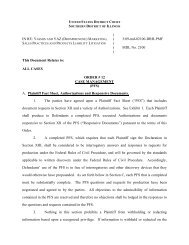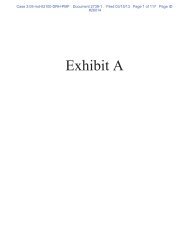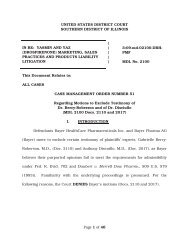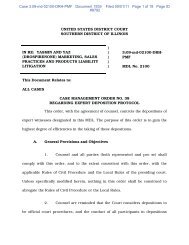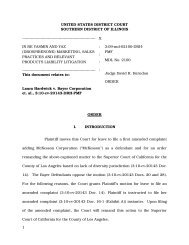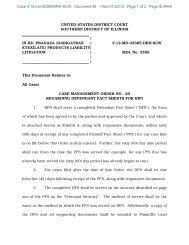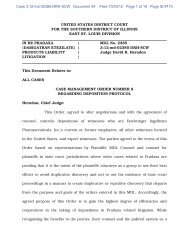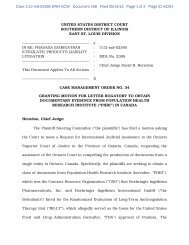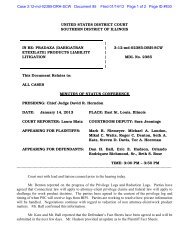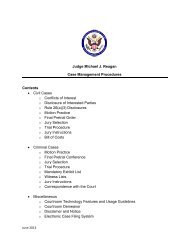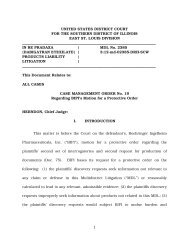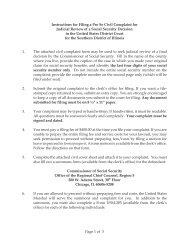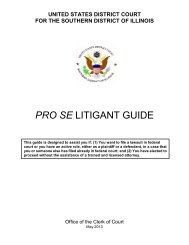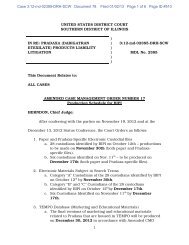Page | 1 IN THE UNITED STATES DISTRIC COURT FOR THE ...
Page | 1 IN THE UNITED STATES DISTRIC COURT FOR THE ...
Page | 1 IN THE UNITED STATES DISTRIC COURT FOR THE ...
You also want an ePaper? Increase the reach of your titles
YUMPU automatically turns print PDFs into web optimized ePapers that Google loves.
Government had not argued that the remedy of suppression is unavailable in forfeiture<br />
proceedings under 21 U.S.C. 881. However, in his concurring opinion, Judge<br />
Easterbrook expressed concern with the assumption that suppression motions are<br />
appropriate in civil forfeitures:<br />
All parties assume that the exclusionary rule applies to forfeiture, so<br />
that the res must be returned if it was improperly seized. Yet the<br />
Supreme Court has twice held that the exclusionary rule is not used in<br />
civil proceedings. See <strong>IN</strong>S v. Lopez–Mendoza, 468 U.S. 1032 … (1984)<br />
(deportation); United States v. Janis, 428 U.S. 433 … (1976) (taxation). See<br />
also Pennsylvania Board of Probation & Parole v. Scott, 524 U.S. 357 …<br />
(1998)(rule inapplicable to probation revocation). Although One 1958<br />
Plymouth Sedan v. Pennsylvania, 380 U.S. 693, 85 S.Ct. 1246, 14 L.Ed.2d 170<br />
(1965), suppressed evidence in a forfeiture, Janis stated that this was<br />
because that forfeiture was intended as a criminal punishment. 428 U.S. at<br />
447 n. 17…. The forfeiture in our case is civil. It is farther from a criminal<br />
prosecution than is a probation-revocation proceeding.<br />
Suppressing the res in a civil proceeding, even though the property is<br />
subject to forfeiture, would be like dismissing the indictment in a criminal<br />
proceeding whenever the defendant was arrested without probable cause.<br />
The Supreme Court has been unwilling to use the exclusionary rule to<br />
“suppress” the body of an improperly arrested defendant…. Why then<br />
would it be sensible to suppress the res?<br />
Marrocco, 578 F.3d at 642 (emphasis added).<br />
Similarly, the District Court for Northern District of Illinois has pointed out:<br />
The Supreme Court has suggested that, barring “egregious” Fourth<br />
Amendment violations, the exclusionary rule does not apply in civil<br />
proceedings. See Krasilych v. Holder, 583 F.3d 962, 967 (7 th Cir.<br />
2009)(citing <strong>IN</strong>S v. Lopez-Mendoza, 468 U.S. 1032, 1050-51 … (1984)). The<br />
primary purpose of the exclusionary rule is to deter unlawful police<br />
conduct. Courts have generally held that application of the exclusionary<br />
rule to criminal trials alone creates an adequate deterrent; any marginal<br />
benefit gained by extending the exclusionary rule to civil proceedings<br />
tends to be outweighed by the social cost of losing probative evidence. See<br />
generally United States v. Janis, 428 U.S. 433 … (1976).<br />
<strong>Page</strong> | 13



